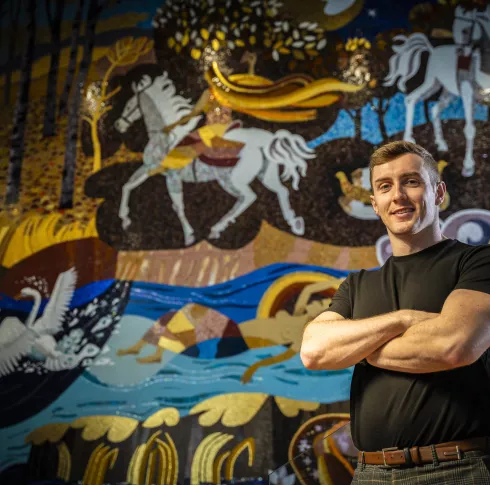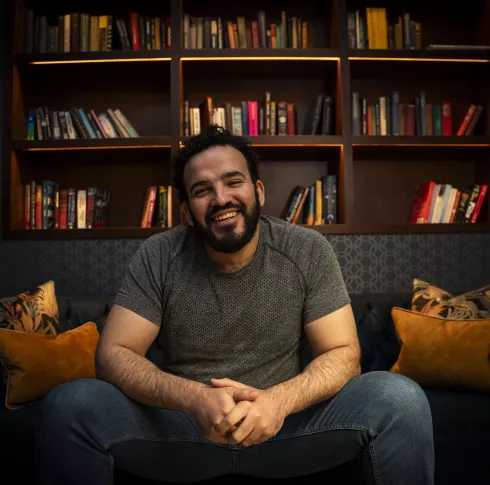
Alison Sweeney is the Senior Music Therapist at CHI at Temple Street and a graduate of the MA in Music Therapy at University of Limerick.
______________________
Alison Sweeney’s passion for music was apparent from a very young age, but little did she know back then that marrying this musicality with her deep interest in human behaviour would eventually determine a career calling that has helped shape the healthcare experiences of countless children and their families.
“I was exposed to a lot of great music as a child. I come from a really musical family, and I remember listening to recordings and trying to figure out ‘What's that sound’ ‘What could that instrument be?' As a very young child, I’d sit for hours at the piano trying to figure out really simple children’s melodies.
“As I grew older, I became more curious about human behaviour – understanding why people act in certain ways and why we do what we do. It was around that time that I started to song write, which brought both of these things together.”
The path to her current role wasn’t immediately clear, however. Alison emigrated to the UK following her undergraduate studies, where she taught piano before she considered further training to become a Music Therapist.
“I think I needed time to come to that decision. I was living over in London and I was teaching piano. I had a number of experiences that brought me to a point in my life where I thought ‘I should be a music therapist.’
“I had been working with a young adult who had an intellectual disability. I learned so much from him and his love of music. Later, I worked with a young person who was gifted musically. These were some of many experiences that made me think about our relationship with music. Music had always been central in my life but I began to understand how important it was to others. Lots of little experiences got the cogs turning for me, considering how everybody experiences music in their own unique way.
“I was driving home from work one day and I just had that realisation; this is what I should be doing. This just makes sense for me. It was from there that I started to do a lot of research into music therapy, read a lot of research papers, and I thought ‘Okay, if I can read these case studies and I'm still interested in learning more, maybe this is for me’.”
With that spark now firmly ignited, Alison set about determining where best to go to make this dream a reality. It would mean a return to education, but a decision had to be made on whether to pursue her goals in the UK, or to return home to Ireland for the next step.
“The reason I chose the University of Limerick was really down to the faculty staff. The team there are so highly regarded in the world of Music Therapy. The faculty team in UL are honestly second to none. So, I knew I would be in really safe hands from that perspective.
“Another really big factor for me was the reputation of the University of Limerick. Both of these things that made me decide to leave the job in London, pack up my things, and head home to Ireland for the next two years.”
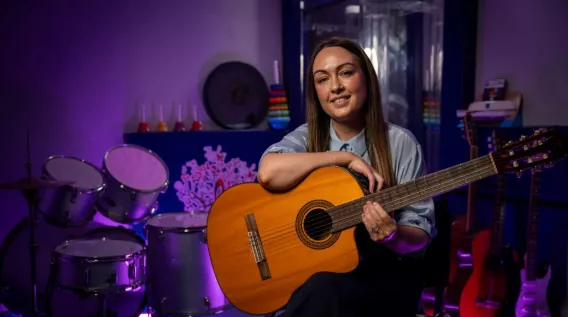
Despite the not-insignificant matter of very uncertain employment prospects in her field at that time, Alison was all-in on her belief that this was where she could make a difference.
“It was more than ten years ago when I graduated and there was still very little known about music therapy in Ireland at the time. The job prospects were uncertain. So, there were risks.
“But I just felt so passionate about it, I just knew that I could make a success of it because I believed in it so much. I think that was the single biggest driving force, my own belief in music therapy.
There were very early signs it was absolutely the right decision.
“I remember walking across the Living Bridge to the Irish World Academy on the first day and thinking, ‘It's so good to be home.’
“Walking that beautiful bridge with the Shannon underneath it and the sound of the water… having come from a very busy London city environment, I just felt really happy with my decision. And of course, the Irish World Academy of Music and Dance is just spectacular. It was just such a special place to get to show up every morning.”
UL’s focus on real-world applications of learning meant that it was some of the off-campus elements of Alison’s journey that proved to be most memorable.
“Some of the highlights for me personally were the clinical placements that I got to do. One of the single biggest aspects of my Master's experience was coming to Temple Street to do my final clinical placement.
“It was really that experience that gave me the foot in the door here to show people what music therapy could offer in this kind of a clinical environment. It was building on the connections that I made here from that student experience that I was able to garner enough support to build this service.
“Prior to me beginning here in 2015, there was no music therapy service at Temple Street. So that's a direct result of my experience on the course, the opportunity that the course afforded me, and an incredible outcome.
“Now, I feel so proud that we are able to host other students and so proud of how much music therapy has grown in the last 12 years. It's wonderful to see students coming in who have that same passion and that same eagerness to learn that I did 12,13 years ago now. To host those placements is very much a full circle moment.”
Now, Alison spends her days dedicated to helping young people and their families navigate their hospital experiences, at what is often a very difficult time in their lives.
“I work with the neurosurgery, neuro-rehabilitation, and palliative care teams. The work is child and family centred and my primary focus is on the social and emotional aspect of every young person I meet. A lot of young people I work with have come to hospital very suddenly which can be a terrifying experience. My role is to support them as they navigate their hospital journey and provide opportunities for them to express and cope with their experience of illness and treatment. Another core aspect of my job which I love is joint work with other therapists - SLTs, OTs, physiotherapists etc. Whether we are working with a child with communication or physical needs, music therapy can support them in meeting their clinical goals. I'm so fortunate to work with the most amazing, caring team of people.”
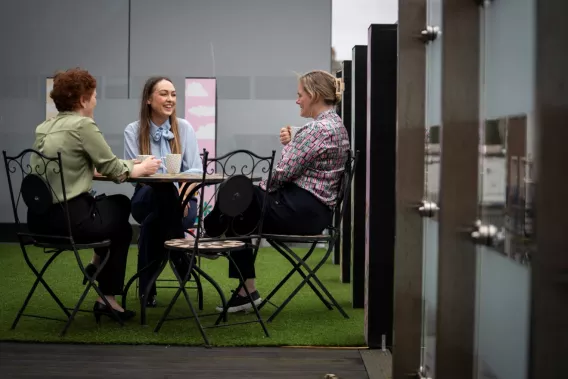
Of course, the journey of learning never stops.
“I think to be a music therapist, one of the core skills you need is empathy. It’s really important to be able to look at what these families are going through, and to be able to try and understand the experience from their perspective, because that means that we approach our work in a really considered and a really sensitive way.
“Another very important piece is self-reflection, and I think any therapist will tell you the same thing. We're constantly learning from every single young person that we meet. For me, the ability to step back and reflect on those experiences and to be able to say, ‘I could have done that better’, ‘there was learning in that for me’, and ‘the next time I'll approach that situation like this’. My work is guided by families and that's been really central to the service that we have built here. The service has been shaped by the children and young people who access it.”
While looking back at how far Music Therapy has come in Ireland in recent years, Alison is also conscious of how much more can be done and is looking to one near-future landmark as a big moment to reflect and celebrate.
“When I qualified 12 years ago, there was one music therapist working part-time in acute paediatrics in the country. The idea of getting a full-time job in this area was such a dream of mine. I'm genuinely so proud to be here today and to see that progression over the last 12 years.
“My absolute goal is to have a creative arts therapy service in our new children's hospital. That's something that we've been working really hard on. Not just music therapy, but art therapy as well. I believe that those disciplines can really offer so much to young people.
“I think when we get to that point and we’re all working together under one roof, that will be a real full circle moment for me. And at that point, the new chapter really begins.”
While looking back at how far Music Therapy has come in Ireland in recent years, Alison is also conscious of how much more can be done and is looking to one near-future landmark as a big moment to reflect and celebrate.
“When I qualified 12 years ago, there was one music therapist - a now dear colleague - working part-time in acute paediatrics in the country. The idea of getting a full-time job in this area was such a dream of mine. I'm genuinely so proud to be here today and to see the progression over the last 12 years. We now have a small but highly dedicated team of Music Therapists working across Children's Health Ireland, all doing amazing work in their specialist areas. I'm one of three senior Music Therapists in CHI and together, we have worked incredibly hard to develop the service, keeping the child and family at the centre of every decision we make.
“My absolute goal is to have a creative arts therapy service in our new children's hospital. That's something that we've been working really hard on. Not just music therapy, but art therapy as well. I believe that those disciplines can really offer so much to young people.
“I think when we get to that point and we’re all working together under one roof, that will be a real full circle moment for me. And at that point, the new chapter really begins.”
It couldn’t be any clearer that following her passion has led Alison to an incredible career. Does she have any words of wisdom for others who might be considering a change in career track, or a return to education?
“I would say to anybody who's considering further education - just do it.
“You will never regret educating yourself further. And it's never an easy decision, especially when you've been out of education for a while. But I really feel that if you find an area that you're passionate about and you're willing to put in the hard work, you're halfway there at that point.
“Take the risk and bet on yourself.”
If you’re curious about what you might achieve through postgraduate studies, you’ll have all the support you need at University of Limerick. #StayCurious
View our full range of graduate and professional programmes here.
Stay Curious and register your interest to stay informed about postgraduate and professional courses at UL.
Hannah Wrixon on the struggle to juggle and making room for yourself in your own life
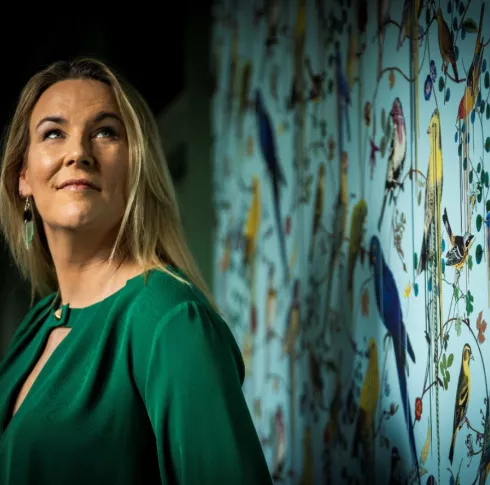
Graduate and Professional Studies
+353 (0)61 234377
University of Limerick, Limerick, Ireland
Contact Us | Download Prospectus | Sign up to stay informed | Quality and Feedback
